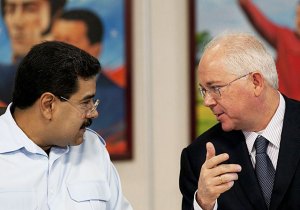It's Rafa's world


With this finger, I control your destiny

One of these men controls Venezuela. The other used to be a bus driver.
Whomever you choose to support in the current debate raging among Venezuelan economists (suggesting, by the way, that we economists need to tone it down and get out more), there is one thing we can all agree on: Rafael Ramírez is firmly in control of economic policy.
This doesn’t mean he’s in control of the government, but it does mean that he has consolidated his grip on power, particularly with regards to economic decisions.
Factors inside chavismo will resist any inclinations to implement what he laid out in his now famous London speech. And his moves will require something he doesn’t have: political leadership. If he were working for a President who could compensate for that, things would be different. Instead, he is working for Maduro.
No person in Venezuelan history has ever held the job of Oil Minister, President of PDVSA, and Chief Economic Minister. I venture to say that nobody short of Hugo Chávez has ever wielded as much power in modern Venezuelan history. Is it an exaggeration to suggest Ramírez is now more powerful than Maduro?
Ramírez makes the policies, he writes the checks that underwrite the policies, and he writes the other checks that finance (or doom) the political campaigns needed to reward (or punish) people depending on their support (or rejection) of his policies. Even the Cubans depend on him.
I tried to convey that in my latest piece for Foreign Policy’s Transitions blog. The value added:
Given the government’s terrible political situation, Ramírez may not have much room to maneuver. Implementing tough decisions may prove too costly for the government, and Ramírez may not have the time to convince the rest of the cabinet about the wisdom of his measures.
Yet after years of dealing with the world’s oil companies, he could be described as a skilled negotiator. Ramírez will need all the skills he possesses to navigate the waters of power in Caracas.”
Caracas Chronicles is 100% reader-supported.
We’ve been able to hang on for 22 years in one of the craziest media landscapes in the world. We’ve seen different media outlets in Venezuela (and abroad) closing shop, something we’re looking to avoid at all costs. Your collaboration goes a long way in helping us weather the storm.
Donate




